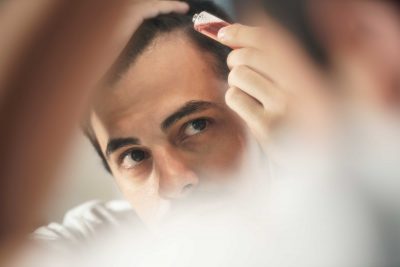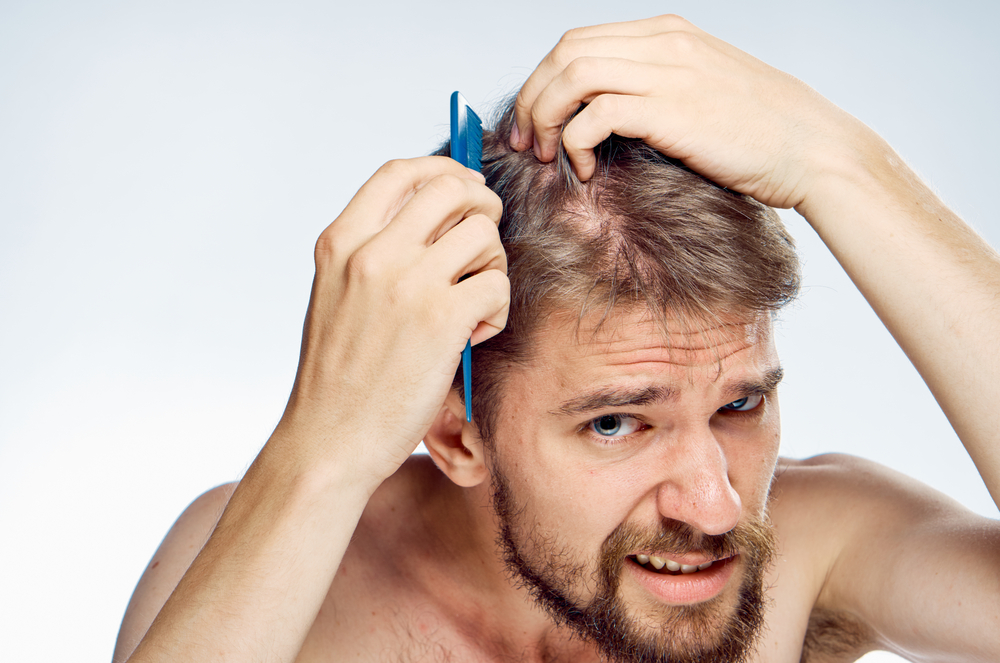For men, one of the most disheartening parts of getting older is coming to terms with hair loss. 95% of all hair loss in men is attributed to male-pattern baldness, and more than 70% of men start to experience a certain degree of hair loss before they reach their 35th birthday.
Hair loss could drastically impact a man’s self-image and confidence, and the worst part about it is there’s no quick solution that would help you cope with hair loss.
The phenomenon is so prevalent that it has become normal for men to expect hair loss. At first, your hairline starts receding. Year after year, your hairline recedes even further, until you decide to shave it all off and go bald.
Male-pattern baldness has a very unique pattern. It starts from the forehead and begins to recede as men get older. Male-pattern baldness only affects the top section of the scalp, and it rarely develops to other forms of alopecia, such as alopecia totalis, or the complete loss of hair on the scalp.
Researchers have looked into the causes of male-pattern baldness to help us understand its causes, treatment, and prevention.
What causes hair loss in men?
One of the earliest studies about male-pattern baldness links high testosterone levels as the cause of androgenic alopecia, and more recent studies have pinpointed dihydrotestosterone, or DHT, as the primary cause of male-pattern baldness.
 Testosterone is naturally synthesized, or converted, into DHT through the aromatase enzyme. DHT is an androgen that interacts with androgen receptors, mostly in the hair follicles, liver, and prostate.
Testosterone is naturally synthesized, or converted, into DHT through the aromatase enzyme. DHT is an androgen that interacts with androgen receptors, mostly in the hair follicles, liver, and prostate.
Since testosterone is naturally converted by the body to DHT, an increase in testosterone levels would also cause a directly proportional increase in DHT levels.
DHT is a potent androgen that can promote better sex drive and muscle growth, but a buildup in DHT levels could lead to serious health problems. DHT buildup causes benign prostatic hyperplasia (BPH), or more commonly known as prostate enlargement. Its interaction with the prostate could further increase your risk of developing prostate cancer.
DHT buildup is extremely problematic since the complications caused by DHT manifests quickly, and it takes months and even years to reverse the damage of DHT.
Dermatologists often prescribe antihypertensive vasodilators such as Minoxidil to promote blood flow in the areas affected by male-pattern baldness and promote healthier hair follicles. Minoxidil treatments may need a few months of consistent application to promote better hair growth.
These days, it’s fashionable to shave it all off instead of going with a bald top. If you have a receding hairline, your looks should be the last thing you should be worried about since the same hormone that causes male-pattern baldness also causes prostate growth and even prostate cancer.
Can Low Testosterone cause Hair Loss?
On its own, testosterone does not have any direct effect on hair loss. Testosterone’s derivative hormone, DHT is responsible for hair loss.
Low testosterone does not cause hair loss, but hair loss might be a sign that you have low testosterone levels.
Not all cases of hair loss in men are caused by dihydrotestosterone. A small fraction of these cases is caused by stress, which could manifest in the thinning of hair follicles, leading to hair loss.
Being in a consistent stressed state would increase cortisol levels in the body. Cortisol, the stress hormone, significantly reduces testosterone production, and this leads to low testosterone levels.
Androgenic alopecia, or male-pattern baldness, has a distinct pattern, and if your hair loss doesn’t quite match the usual hair loss you see in most men, then you might have an autoimmune disorder caused by stress, which would also indicate that you may have low testosterone levels.
Testosterone Replacement Therapy (TRT) is known to aggravate androgenic alopecia since it artificially raises testosterone levels in men. DHT levels are directly proportional to the body’s testosterone levels, and without taking medicine or supplements that inhibit the 5alpha-reductase enzyme to limit DHT levels, men on TRT would likely experience hair loss.
How to cope with hair loss in men
 There are plenty of options available to you to help you cope with hair loss. In most cases, hair loss is not permanent, and you could take prescription medication and supplements to help you regain a full head of hair.
There are plenty of options available to you to help you cope with hair loss. In most cases, hair loss is not permanent, and you could take prescription medication and supplements to help you regain a full head of hair.
The most common treatment for hair loss is through topical vasodilators such as Minoxidil. Minoxidil helps improve hair growth by increasing blood flow to the scalp.
This allows the hair follicles to thicken and create a firm anchor to the scalp. Minoxidil treatments usually take months to years, and you will need a consistent application of minoxidil to preserve hair growth.
Minoxidil can improve hair growth, but high levels of DHT can still impair hair growth. To manage DHT levels, your doctor may recommend a 5alpha-reductase inhibitor supplement such as Fenugreek to limit and reduce DHT levels.
If you are going through testosterone replacement therapy, then it would be advisable to ask your doctor about your hair loss concerns. Your doctor may prescribe additional therapy or medication to minimize DHT levels.
Conclusion
Low testosterone does not cause hair loss, but it can greatly impact your quality of life nonetheless. The sharp drop in libido and muscle mass can greatly impact your confidence. Low testosterone can also cause erectile dysfunction, weak bones, and impotence, and these are health issues that need to be addressed.
You’ll be happy to know that low testosterone is a lot easier to deal with than hair loss. By simply taking Male UltraCore, you can regain your normal testosterone levels, and even enhance your physical, mental, and sexual performance along the way.
Male UltraCore is powered by VI-PEX and STEM technology, two cutting-edge technologies that combine testosterone enhancement with vasodilation to maximize libido, muscle growth, erection size, and cognitive performance.
Male UltraCore also contains Fenugreek, an ingredient with highly-effective 5alpha-reductase inhibitor properties to limit the conversion of testosterone to DHT. By taking Male UltraCore, you can significantly reduce hair loss and improve hair growth with its potent vasodilator ingredients.








COMMENTS